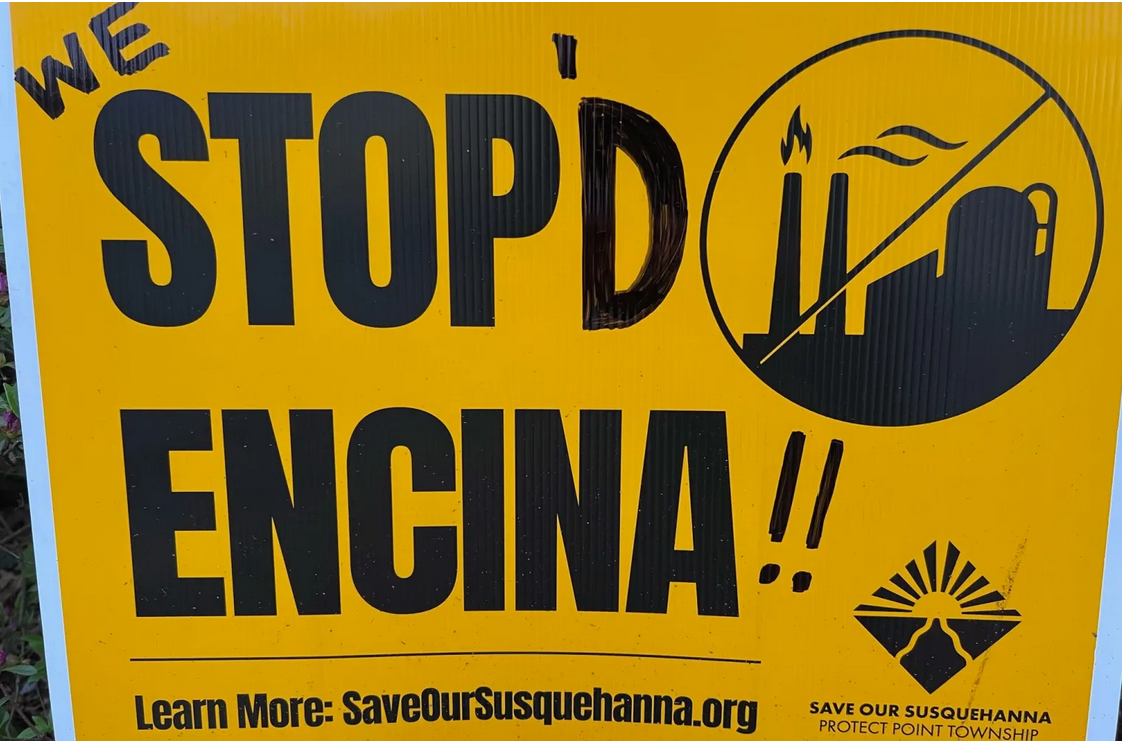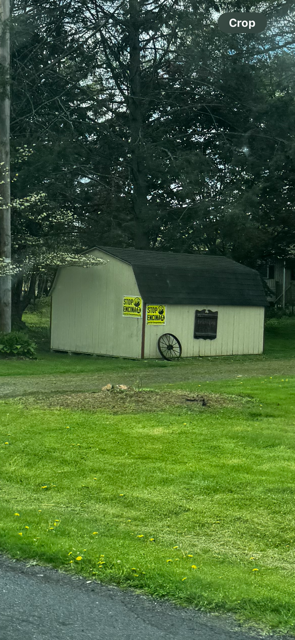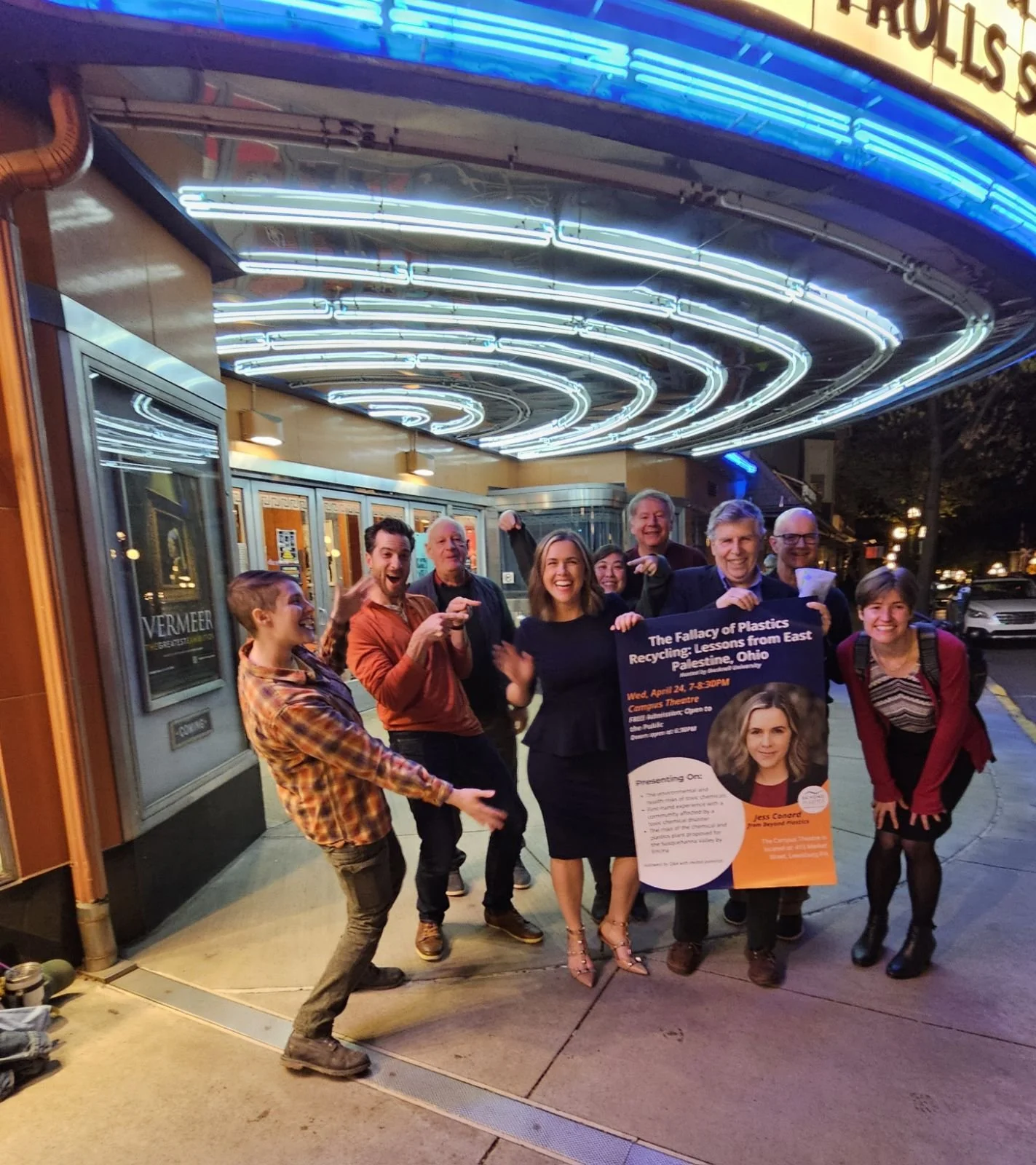✌️Chasing Off a Polluting “Chemical Recycling” Plant in PA 🚫
This spring, a grassroots group called Save Our Susquehanna (SOS) in central Pennsylvania succeeded in defeating Houston-based Encina’s proposed “chemical recycling” plant, one of the nation’s largest proposals to date.
On April 18, roughly two years after it first pitched the proposal, Encina issued a press release announcing its decision to drop the proposed plant.
““At the current time, Encina will not move forward with the construction of its circular manufacturing facility in Point Township, Pennsylvania.” ”
The company’s announcement represents a major grassroots victory for Pennsylvanians and was made possible by steadily escalating grassroots opposition led masterfully by SOS, with assistance from groups including The Climate Reality Project, Clean Air Council, GAIA (The Global Alliance for Incinerator Alternatives), and Beyond Plastics. Read on for more details about how the local advocates took on Encina and won.
Photo by George Ferrandi, courtesy of Save Our Susquehanna.
Focus Central PA, a group working to turn central Pennsylvania into a plastics corridor was supportive of Encina’s proposed project. Using heavily greenwashed language, Encina convinced the Northumberland County chapter of DRIVE, a government-funded economic development entity, to support its proposal, touting the opportunity to bring clean, family-sustaining jobs to the area. Initially, the community was excited about Encina’s proposal. After all, who doesn’t want good jobs? But after attending a few community meetings and leaving with a mountain of unanswered questions, local residents from Point Township, Selinsgrove, Lewisburg, Danville, Sunbury and Northumberland Borough were left scratching their heads.
Aerial view of proposed Encina facility location located next to the Susquehanna River.
Encina proposed to build in the flood plain of the Susquehanna River, which is the 16th largest river in North America, and is known as “Pennsylvania’s River.” It is a source of drinking water for nearly four million Pennsylvanians. The abundant recreational opportunities along the Susquehanna River have also made it a widely popular water trail, earning it three “National Recreation Trail” designations from the National Park Service. Not surprisingly, the community was very concerned about the potential environmental and health impacts of a plastic waste and “chemical recycling” plant sited along the mighty Susquehanna.
The proposed Encina plant site. The river is just beyond the trees. Photo by Jess Conard, Beyond Plastics.
Encina sought to implement its project in two phases. Phase One consisted of a mechanical sorting facility for plastic waste to which they would truck in 450,000 tons of plastic waste each year. This averages out to roughly 110 truckloads a day traveling in and out of the small, busy downtown area near schools, churches, homes, and a hospital. Phase Two consisted of a pyrolysis facility purported to convert plastic waste into hazardous liquid chemicals using very high heat. However, this process, one of the many technologies that fall under the heading of so-called “chemical recycling,” is a technology that has never been proven to work at scale. In fact, “chemical recycling” isn’t considered recycling by internationally accepted definitions and it is prone to fires and explosions as well as significant air, water and soil pollution. Learn more about the realities of “chemical recycling” in Beyond Plastics’ October 2023 report, “Chemical Recycling: A Dangerous Deception.”
Additionally, Pennsylvania is one of about two dozen states that have recently reclassified “chemical recycling” from waste management to manufacturing, a change that would exempt facilities like the one Encina proposed from existing state-wide solid waste management laws and regulations that are designed to protect the environment and the health of fenceline communities. This is a dangerous deregulation that leaves communities like Point Township and others throughout Pennsylvania at increased risk of health and environmental harms.
The train tracks that would have been transporting BTX (benzene, toluene and xylene polymers) and other hazardous chemicals are located roughly 1/2 mile from the proposed site. Note the flood walls which are built all around the town. Image by Jess Conard, Beyond Plastics.
After educating themselves on the dangers Encina would bring to the health and safety of the community and environment and how other facilities like Encina outsource the jobs they were estimating would be available to the community, SOS was formed under the leadership of The Climate Reality Project: Susquehanna Valley, PA chapter. A few volunteers turned into ten and ten turned into 20, and the group continued to grow. By building good relationships with many national organizations like Clean Air Council, GAIA, and, of course, Beyond Plastics, SOS was able to utilize funding resources, legal advice, media connections, and experience from other site fights to make a plan to give Encina the boot.
SOS hit the ground running and started attending council meetings, hosting town halls and other speaker and panel discussions to educate and engage with the community. It became clear that the community had not known about the dangers that Encina would bring to the valley. More promotions were needed to continue to inform all the river communities like the historical areas and Chesapeake Bay Watershed to name a few. These beloved, one-of-a-kind areas would risk complete destruction if something at the Encina facility went wrong, or worse, if a train derailed with the carcinogenic chemicals the plant was saying they would create from plastics. Funding became available through grant applications to make bright yellow signs, banners, mailers, flyers, and bumper stickers. The messaging was working and the community was outraged!
Homes next to the proposed Encina site in Point Township, PA sport one (or more) STOP ENCINA signs. Images by Jess Conard, Beyond Plastics.
Once SOS had gained local support, many felt the urgent need to talk to their elected officials. SOS decided to create a resolution which would allow each of the at-risk community councils to vote and make a promise to their constituents that they would not allow a dangerous chemical recycling proposal to be sited within their borders. Northumberland Borough was the first brave council to pass a resolution stating their opposition to the plant being built in the neighboring community of Point Township.
Encina’s initial response to the Northumberland resolution indicated that the company would continue to move forward. However, a few weeks later, Encina met with DRIVE and decided they no longer wanted to pursue their plans in this prone-to-flooding area and made their much-welcomed announcement.
The SOS group was elated to hear the news. Their “get it from all angles” approach had worked! SOS is a motivated and diverse group made up of people from a range of political and religious backgrounds, careers, and ages who worked together to meet a common goal. Partnering with each other this way was instrumental in building good relationships with business leaders, faith leaders, and faculty and students from the local university who pitched in to help defeat Encina’s proposed plant.
Members of SOS hosted Beyond Plastics’ Jess Conard for a talk at Bucknell University’s Campus Theatre in late April.
The Pennsylvania Constitution’s Environmental Rights Amendment, Article I §27, declares that the people have a right to a clean environment, which includes clean air, water, and soil. This article is explicit about the state’s responsibility to protect the natural, scenic, historic, and esthetic values of the environment. Pennsylvania's public natural resources are the common property of all people and its integrity should be preserved for future generations. By using laws that were already established, creating fundamental relationships to educate residents and decision-makers about the realities of “chemical recycling” and encouraging local leadership of the group, SOS claimed their victory over Encina and residents in Point Township and neighboring towns can now breathe a sigh of relief.
“We have been very fortunate that the community here has listened to the concerns raised by the members of Save our Susquehanna. I think community members recognized that this petrochemical plant would invite more like it to come to the area and would be a huge threat to our river. The Susquehanna River is the center of life here and people here want jobs that preserve and sustain our rural way of life and support recreational opportunities in the valley. That being said, the group is already working on plans to get the word out about these chemical recycling plants to other communities because SOS is not just a “not in my backyard” effort. Based on what we have learned, we don’t think these chemical recycling plants should be built anywhere. They are toxic and they will not solve the problem of plastics overproduction.”
SOS understands that while Encina takes a pause, it will soon turn its eyes to other communities. In addition, there are dozens of other communities who are currently being greenwashed to believe that “chemical recycling” and plastic production will benefit their communities. The group is motivated to work with other communities in Appalachia and beyond to oppose “chemical recycling” and advance true solutions to plastic pollution. To learn more and get involved, please contact our Appalachia Director, Jess Conard at jessconard@bennington.edu or visit https://saveoursusquehanna.org/ to learn more.
RELATED NEWS COVERAGE
A Giant Plastics Chemical Recycling Plant Planned for Pennsylvania Died After Two Years. What Happened? | Inside Climate News | 4/26/24
Activists celebrate as plans for a chemical recycling plant are canceled | Allegheny Front | 4/26/24
UPDATE: Encina moving away from Point Township plant | The Daily Item | 4/24/24
LEARN MORE ABOUT “CHEMICAL RECYCLING”
“Chemical Recyling”: A Dangerous Deception | Beyond Plastics & IPEN | October 2023












